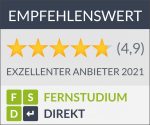MSc Cyber Psychology
Distance learning for working professionals - Duration: 1 year (optional 2 years)
Fulfill your desire for a prestigious international Master’s degree from the renowned, state-recognized London Metropolitan University in a work-accompanying manner, without having to give up your home base – with the flexible distance learning programme “Master of Science Cyber Psychology”.
Take the next career step in the health sector
- Degree: Master of Science (M.Sc.) at Level 7 of the European Qualifications Framework (EQF)
- Doctorate: Eligible for doctoral studies (depending on the university’s doctoral regulations)
- Duration: Only 1 year to complete the programme
Course content and benefits
- Practical and well-founded: Acquire practical knowledge in Cyber Psychology
- Flexibility: 100% online – study flexibly from anywhere in the world
- Admission: Generally requires a prior degree. In exceptional cases, however, admission is possible without a bachelor’s/first degree
Make your choice now and save
- Tuition fee: Instead of €
11,850.24now only €9,793.32 (VAT-exempt) - Payment by instalments: €816.11 x 12 months possible
- Study on trial: Study free of charge for 28 days
- Tuition fee: Instead of €
Show your internationality. Register today and start your journey to a recognized Master of Science.

Study on Trial for 28 days
What else is important...
Our graduates
University
Conducting the entire distance learning programme, including student support, through the accredited AIHE Academic Institute Germany.
Enrollment and degree awarding by the state-recognized London Metropolitan University.
Start of studies
First start, expected 1 February 2025
WS 01.09.*
SS 01.02.*
*Access to the learning platform, in order to be able to work ahead if you are interested, is possible immediately after signing the contract.
Scope / Place allocation
10 – 25 working hours per week, depending on previous knowledge 90 ECTS. The selection process is based on the order in which applications are received, taking into account qualitative criteria and the outcome of the entry test (for those without first degree). |
Admission Requirements
First degree (at least bachelor) from a recognised German or comparable other foreign university
or
the equivalent of the first university degree is considered to be at least six years’ relevant professional experience.
All interested persons who do not hold a first academic degree will take a written admission test (answering questions in writing) and a short video interview for this purpose. For more information, please contact us by email or phone.
Furthermore, the following additional qualifications are welcome: knowledge e.g. in the field of psychology, psychotherapy, medicine or another field that is relevant to the course of studies.
Title after Brexit
Until an agreement is reached between the EU and the UK, the city of the university awarding the title should be named to be on the safe side.
Our recommendation:
Max Mustermann (MSc London)
Max Mustermann (MSc) London
Academic Degree
Master of Science/ MSc Cyber Psychology
Recognition and Certification
The London Metropolitan University is rated H+ on ANABIN and is therefore recognized (accredited, certified, etc.) in a significant way. This master’s programme is approved by the “Zentralstelle für Fernunterricht” (ZFU) in Germany with the registration number: 1106720. |
Reported to the Ministerium für Bildung, Wissenschaft und Kultur Schleswig Holstein.

Training focus of the
Master's programme
The content of the one-year master’s programme is based on the following seven focal points:
Introduction to Scientific Work and Cyber Psychology
Research Methods & Scientific Work in Cyber Psychology
- Scientific Writing and Citation Convention of APA (7th ed.)
- Research Methods in Cyber Psychology
- Evidence-based Science, Research, and Practice
Introduction to Cyber Psychology
- Definitions
- History of Cyber Psychology
- Introduction to Virtual Reality, Artificial Intelligence, and Computing History
Psychology of Online Behaviours in Cyberspace
Personality, Self, and Identity in Cyberspace Online Identity and Self-representation in Cyberspace
- Computer-Mediated Communication
- Group and Interpersonal Interaction Dynamics in Cyberspace
Social Media, Networking, and Communication
- History and Psychological Impact of Social Media
- Online vs. Offline Interactions
- Interactivenes and Participation in Cyberspace
- Cyberlove: an alternative scape for romantic intimacy
Cyber Technologies for Consumers
- Psychology of Online Consumer Behaviour
Interaction in Virtual and Gaming Environments
Dynamics and Effects of Online Games
- Online Games and Well-being
- Psychology of Video Games
- Video Games Addiction
Virtual Reality and Gaming Environments
- Human Computer Interaction
- Ethics of online Interactions
Cybercrime
Types of Cybercrime and Theories of Cyber Deviance
- Defining Cybercrime and Typologies
- Psychology of Cybercrime
- Personality of Cybercrime
- Cultural Differences
Dealing with Cybercrime
- Cyber Law and Regulations
- Legislation in Cyberspace
Children and Teenagers’ Usage of Online Media
Psychological Challenges of Conventional and Virtual Development
- Children and Digital Media Interaction
- Association Between Linguistic skills and Screen Exposure for Children
Cognitive and Neuropsychological Dynamics
- Digital Technologies’ Influence on Children
- Digital Technologies and Human Brain Interaction
- Association Between Children’s Learning Ability and Digital Interactivity
Ethics of Parenting and Guardianship of Young Adults
- Interventions and Preventions in Social Media
- Privacy vs. Sharenting
- Digital Parenting
Online Psychological Counselling and Support
Online Counselling and Support Practices
- An Overview of Psychological Support in Online
- Online Health Seeking
Online Clinical Work and Therapeutic Interventions in Cyberspace
- Online Psychotherapy
- Virtual Reality in Mental Health Treatment
- Online Therapeutic Ethics
Master´s Thesis
- Written master´s dissertation
- Recorded presentation
Distribution of priorities
Master's Programme in detail
SCIENTIFIC FOUNDATION FOR EXPERIENCED PROFESSIONALS | WITHOUT A FIRST UNIVERSITY DEGREE or Bachelor´s degree
The innovative master’s programme focuses on a diverse curriculum of psychological topics set in a cyber environment. Its academic foundation enables our graduates to understand and create the latest developments in their field of profession, with a focus on the cyber world.
DEVELOPMENT OF KEY COMPETENCES | MASTER’S DEGREE THROUGH DISTANCE LEARNING
Students will be able to start or build on their chosen profession through an understanding of Cyber Psychology, and therefore be able to face future challenges and changes concerning their line of work. The distance learning format trains them in online communication and working in virtual teams – hence the content and methods in the course would overlap
TRENDS AND RESEARCH TOPICS OF THE FUTURE | Cyber PSYCHOLOGY
Researching and dealing with up-to-date advances in the topic gives the graduates the possibility to foresee coming trends in their own workplace. An appreciation of the changing world of online behaviour gained through this programme will enable students to question existing behaviours and practices and help to replace them with adjusted ones that are fit for future.

FOR WHOM HAS THIS MASTER’S PROGRAMME BEEN DESIGNED?
The master’s programme is an applied course, intended for all those who wish to focus on an interdisciplinary and contemporary approach towards understanding online communication from a distinctly psychological perspective. It is expected that many of the potential students will have an interest and professional aptitude to begin with, and this master’s programme will enable them to craft the way forward in a more applied and multidisciplinary way.
Our target group
Freelancers
Lecturers
Therapists
Mediators
Consultants
Cyber Security Experts
Software Programmers
Game Developers
App Developers
Leaders
Heads of Department
Team Leaders
System Analysts
IT System Administrators
Project Managers
Human Resource Managers
Police and Law Enforcement Officials
Practitioners
Social counsellors
Social Psychologists
Organizational Psychologists
Start-up Company Managers
Social Scientists
Social and Care Workers
Legal Consultants
Media Specialists
Marketing and Advertising Specialists
Learning concept of the Distance Learning Programme
HIGH PRACTICAL RELEVANCE | INNOVATIVE DISTANCE LEARNING | INDIVIDUAL AND COMPETENT STUDENT SUPPORT
The learning concept of the MSc Cyber Psychology course is characterised by a high level of relevance to evidence-based content as well as innovative teaching and learning methods. The design as a pure distance learning course means optimal orientation to the needs of the target group.
The combination of guided self-study, individual student support and e-learning units offers students the possibility of learning independent of time and place, oriented to their own professional requirements and needs.
The use of modern e-learning modules guarantees students interactive learning as well as clear presentation and discussion of abstract content. Interactive Online-Seminars and discussions in virtual space promote the integration of theoretical principles and methods into professional practice. The use of a Virtual Tutorium in the form of an online learning platform enables flexible and network-like knowledge transfer, which can be optimally varied and adapted according to individual learning needs and progress.
The availability of recordings as well as all learning material in electronic form facilitates knowledge management and asynchronous learning for students in a learning group with different professional conditions and open space. In addition, this means easier documentation and repetition of course content, independent of time and place.
Overview of the Teaching Concept
Guided self-study
In contrast to a study programme with attendance or complete self-study (also: individual study), guided self-study specifies the learning content. As with individual study, teachers are not present, and the time and place of study can be freely chosen. The guided self-study, however, offers you a given thematic and temporal framework and concrete tasks, which are carried out in a self-determined learning process, but which have to be mastered in certain periods of time and in certain forms of learning and working. In addition, teachers and tutors are available to you as contact persons and to support the structuring of guided self-study. The teachers and tutors enable you to structure learning material independently in several ways, to compile suitable information and to use it for the respective requirements of your studies.
The MSc in Cyber Psychology from London Metropolitan University and AIHE GmbH offers you a structured framework for a self-determined learning process. In order to achieve this, comprehensive teaching material and literature as well as study papers are made available in the “Virtual Tutorial” on a learning platform (more detailed description under „Virtual Tutorial“). In addition, there is thematic and methodological support from tutors, which can be used independent of time and place using common communication media.
Virtual tutorial
The MSc in Cyber Psychology of London Metropolitan University and AIHE GmbH uses the learning platform “Moodle” for the supervision of students as well as for the structuring of their studies and for the imparting of learning content, learning material and other study-relevant information. For questions about the content of each module, you can use the Specialist Forums, which teachers and tutors answer within 48 hours from Monday to Thursday. Furthermore, Forums can be used for exchange and organisational issues can be discussed.
All study-relevant dates and deadlines are communicated via the Virtual Tutorial. Students will be informed of each new entry directly via e-mail. All teaching material such as Study Papers, Core Literature as well as web links and other study-relevant information such as the timeline for course planning, tasks, work instructions and literature recommendations are made available digitally via the Virtual Tutorial. The Virtual Tutorial also includes individual support by teachers and tutors via e-mail on specialist and administrative issues.
Individual telephone & video consultation
The MSc in Cyber Psychology of London Metropolitan University and AIHE GmbH offers you the possibility of individual telephone or video consultation for the clarification and advice on professional and administrative study-related matters. You can discuss methodical and content-related questions or learning process-related matters with teachers and tutors in flexibly arranged appointments.
If required, learning groups of several people can also make use of the advice of teachers and tutors in the form of a telephone or video conference.
Live online SEMINAR
During the programme MSc Cyber Psychology of London Metropolitan University and AIHE GmbH there are many online-seminars with various contents.
In general, an online-seminar is a seminar held via the Internet which enables interaction and information exchange between teachers and learners. For the design and execution of the online-seminars in the Master’s Programme in MSc Cyber Psychology, user-friendly software is used which offers a wide range of possibilities for information transfer and interaction. In the online-seminar, questions of contents will be deepened, discussed and applied live via video and audio, via file sharing, presentations, chat etc. The moderation is carried out by teachers and tutors.
Online presentations
The MSc Cyber Psychology of London Metropolitan University and AIHE GmbH uses Online Lectures on selected module content or other study-related content. These are organized via user-friendly software. Teachers and tutors explain the corresponding contents via video and audio. Students can attend the lectures live, ask questions and, in addition or as an alternative, view the recorded Online Lectures in the Virtual Tutorial.
Recorded lectures
In our recorded online lectures, module content is explained in a lively manner and classified by the teaching staff. The recordings can be used as often as desired for repetition and consolidation. The additional provision of transcripts, and audio tracks also supports various forms of learning. Our international teaching staff inspires with competence and experience.
Exercises
As part of the MSc Cyber Psychology of London Metropolitan University and AIHE GmbH, students stabilize the acquired learning structures in exercises through multiple repetitions and in assessment free form. The exercises serve to consolidate the memory content. In addition to the training of the contents within online seminars or other study and examination achievements, the students practice the module contents by working through the online quiz portal, which we provide, among other things, as an APP or smartphone and tablet capable for on the go.
Would you like to apply?
The application for admission to our master’s degree programme takes place in three steps.
Submit your application
Apply electronically using the application form. But before you do so, please take your time to read through the information on distance learning and estimate whether you can and want to invest approx. 12 – 25 hours a week. There will be exciting and relaxing phases, but also phases that are temporarily exhausting. Think about your personal motivation. You should be able to formulate it very clearly for yourself.
Examination of your documents
Upon receipt of your application documents, we, the AIHE, review them and send recommendations for admission to the London Metropolitan University. They will decide if and who will be admitted and inform us of their decision. We will then send you the London Metropolitan University’s decision.
If you are an applicant without a first degree, you will take an entrance test.
Conclusion of contract
As soon as you have received an admission letter, you can conclude the student contract with us. Study places will be allocated according to the order in which applications are received after confirmation of admission. As soon as you have signed the study contract and sent it to us and a study place (limited to 50 places) is available, you will receive the signed contract back. Now your place is secured.
You will be enrolled as a student of London Metropolitan University at the start of your studies and will be a student of this innovative English university.
University Partner
This course is carried out in partnership with London Metropolitan University.
London Metropolitan University:
Study at one of the UK’s most
prestigious universities
London Metropolitan University’s long, rich history starts in 1848 when the Bishop of London and the Reverend Charles Mackenzie established The Metropolitan Evening Classes for Young Men. 1851 Prince Albert is so impressed with the classes that an annual celebration of the students’ work is held under his patronage.
Over the past 100 years, the north London campus has developed into a modern, progressive centre with a strong reputation for widening access into education.
The alumni of London Metropolitan University include Mayor of London Sadiq Khan, comedian Vic Reeves, singer Sinead O’Connor, actor Noel Clarke and Cobra Beer founder Lord Bilimoria.



